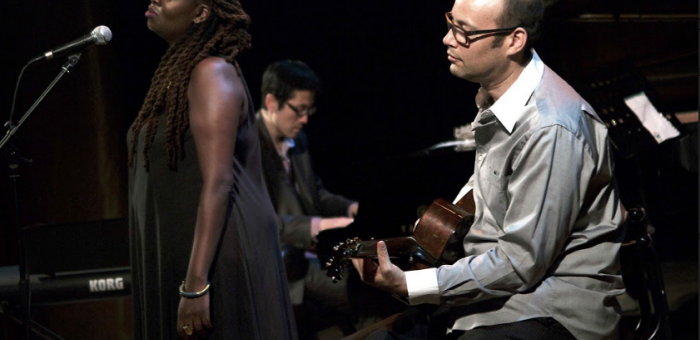Dec 9, 2025 12:28 PM
In Memoriam: Gordon Goodwin, 1954–2025
Gordon Goodwin, an award-winning saxophonist, pianist, bandleader, composer and arranger, died Dec. 8 in Los Angeles.…

Somi (left) Toru Dodo and Liberty Ellman perform at the Sochi Jazz Festival on Aug. 4.
(Photo: Courtesy Sochi Jazz Festival)The testosterone levels remained high the following evening when Butman’s 17-piece Moscow State Jazz Orchestra followed bassist Richard Bona’s Mandekan Cubano band for the second half of the festival’s closing concert at Festival Theater, an open-walled performance space situated yards away from the Black Sea and Sochi’s long boardwalk and rocky beach.
MSJO opened with pianist Nikolai Levinovsky’s chart of Lee Morgan’s “Sidewinder,” highlighted by a lucid, chopsy solo by Vadim Eilenkrig, MSJO’s one-time lead trumpeter. On Butman’s “Samba De Igor” the composer revealed his huge technique and broad conceptual range, building his first solo from Getzian mellowness to turbulent aggression. After a brisk guitar solo by Evgeniy Pobozhiy, Butman ratcheted up the aggression with no diminution of control or tonal accuracy.
Butman opened the next number on soprano sax and, after intricate interplay between the reeds, trombone and Pobozhiy’s guitar solo, Sipiagin soloed with long, flowing lines. Butman, still on soprano, picked up on Sipiagin’s final phrase, but switched to another path, sustaining pitch control even as he “blew snakes” at the climax of his solo.
Sipiagin opened “You Don’t Know What Love Is” with keening tone on trumpet; Vinson riposted, phrasing deliberately and again evoking Benny Carter. The band supported Sipiagin’s solo flight, delivered with a round, warm tone even as he ascended to the stratosphere; Vinson matched the soulfulness for a few choruses—they concluded with an a cappella duo.
When Akkuratov emerged from the wings, he stated a few ominous Prokofiev chords before transitioning to a brisk swinger with a Quincy Jones feeling. Prodded by the superb MSJO drummer Edward Zizak, the pianist played a rhythmically vertiginous solo that blended vocabulary drawn from Tyner and Phineas Newborn. He concluded his section with a medley, accompanying himself on the verse and main lyric section of “Honeysuckle Rose,” which he sang in a pure tenor in the Ray Charles style, interpreting it as an innocent love song, devoid of irony.
He segued to Sinatra gestures on “When Your Lover Is Gone,” self-accompanying in the Teddy Wilson manner, and then moved to “It Had To Be You,” which he delivered à la Harry Connick Jr., complementing his flow with swinging Erroll Garner-esque phrases.
Bona’s Mandekan Cubano ensemble—pianist Osmany Paredes, trumpeter Dennis Hernandez, trombonist Rey Alejandro, percussionists Roberto Quintero and Luisito Quintero, and traps-drummer Ludwig Alfonso—played a relaxed, elegant, percolating set with an energy and joie de vivre belying the fact that, because of travel logistics—it was their final stop on a five-week tour supporting Bona’s new album, Heritage (Qwest)—they were operating on no sleep.
After Bona delivered the third number, a bolero, which he delivered sonero-style with his preternaturally clear tenor, he put forth an undulating bass line over which Cuba-born Hernandez, a New Yorker for seven years, took a muted solo that displayed his absorption of Dizzy Gillespie. Paredes’ flowing chromatic solo sustained the brainy yet booty-shaking spirit; Bona soloed through a sampler, eliciting an accordion-feel apropos of the tune.
The selections traversed guaguanco, rumba, merengue and son; on each one, Bona—who once told me that when he heard Ray Brown, he was reminded of an indigenous rhythm from a village near his home in Cameroon—limned West African antecedents and analogues, creating dialogue between the motherland tradition and her efflorescent diasporic Cuban offspring.
Bona sang superbly, elaborating his stories with an enviable range of voices and attacks, transitioning fluidly to a keening, onomatopoeic falsetto that can evoke a wood flute at one moment, and then, at the next, to the microtonally tuned, percussive thwacks of a talking drum. As he does every night, Bona sang in casually complex syncopated interplay with his bass, upon which he reaffirmed his mastery without particularly drawing attention to his prowess. Rather, he just allowed the lines to flow.

Goodwin was one of the most acclaimed, successful and influential jazz musicians of his generation.
Dec 9, 2025 12:28 PM
Gordon Goodwin, an award-winning saxophonist, pianist, bandleader, composer and arranger, died Dec. 8 in Los Angeles.…

Belá Fleck during an interview with Fredrika Whitfield on CNN.
Jan 13, 2026 2:09 PM
The fallout from the renaming of the John F. Kennedy Center for the Performing Arts to include President Donald…

Peplowski first came to prominence in legacy swing bands, including the final iteration of the Benny Goodman Orchestra, before beginning a solo career in the late 1980s.
Feb 3, 2026 12:10 AM
Ken Peplowski, a clarinetist and tenor saxophonist who straddled the worlds of traditional and modern jazz, died Feb. 2…

The success of Oregon’s first album, 1971’s Music Of Another Present Era, allowed Towner to establish a solo career.
Jan 19, 2026 5:02 PM
Ralph Towner, a guitarist and composer who blended multiple genres, including jazz — and throughout them all remained…

Rico’s Anti-Microbial Instrument Swab
Jan 19, 2026 2:48 PM
With this year’s NAMM Show right around the corner, we can look forward to plenty of new and innovative instruments…